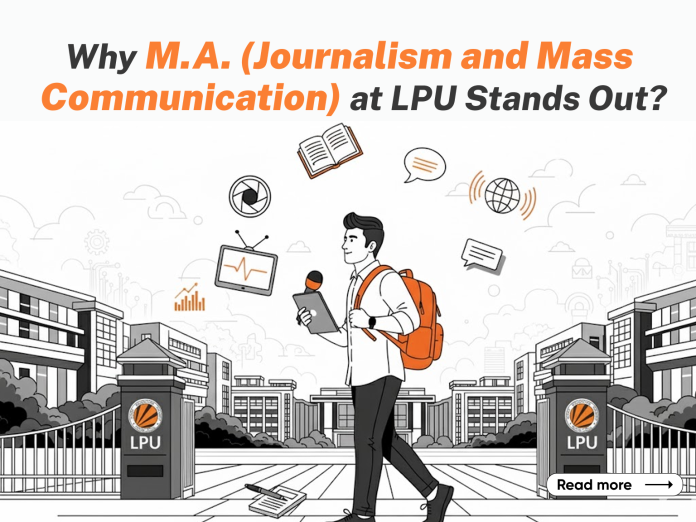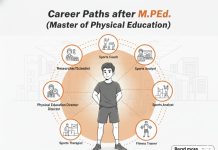- Why M.A. Journalism and Mass Communication at LPU Stands Out?
- Programme Curriculum: What Makes It Unique?
- State-of-the-Art Infrastructure & Labs
- Faculty & Industry Experts
- Practical Exposure: Workshops, Internships & Projects
- Industry Collaborations & Tie-ups
- Global Exposure & Student Exchange Opportunities
- Student Experience at LPU
- LPUNEST Gateway
- LPU at a Glance
- Why Employers Prefer LPU Graduates in Journalism & Mass Communication?
- Conclusion
- Frequently Asked Questions
Why M.A. Journalism and Mass Communication at LPU Stands Out?
In a world where stories shape opinions, visuals change perspectives, and information drives decision-making, the field of Journalism and Mass Communication has never been more powerful. Whether it’s uncovering truth, influencing thought, or crafting digital narratives, communicators are the bridge between society and awareness.
The M.A. Journalism and Mass Communication programme at Lovely Professional University (LPU) isn’t just a degree—it’s an experience that transforms passionate storytellers into confident media professionals. Designed for the new-age communicator, this programme blends the art of storytelling with the science of communication, preparing students for diverse roles across print, broadcast, digital, and corporate media.
Students here don’t just learn about media—they live it. They write, shoot, edit, debate, and create within a vibrant ecosystem that mirrors the professional world. Every classroom becomes a newsroom; every project, a chance to tell a story that matters.
So, why choose M.A. Journalism and Mass Communication at LPU?
Because it gives you:
- A curriculum built for the future of media and communication.
- Hands-on experience in state-of-the-art studios and labs.
- Guidance from top faculty and media professionals.
- Global exposure through collaborations and exchange programmes.
- And most importantly—the confidence to lead conversations in a changing digital landscape.
Programme Curriculum: What Makes It Unique?
Imagine stepping into a classroom where theory meets creativity, and textbooks are just the beginning. That’s exactly what the M.A. Journalism and Mass Communication curriculum at LPU offers. This programme isn’t just about attending lectures—it’s about experiencing media in all its forms, from traditional newspapers to social media campaigns, from radio broadcasting to short-film production.
The LPU M.A. Journalism and Mass Communication subjects are carefully designed to build both foundational knowledge and practical expertise. Students start by understanding communication theories, media ethics, and research methods, which form the backbone of every professional journalist. As they progress, the curriculum introduces advanced topics such as digital media strategies, broadcast journalism, documentary production, and content creation for social platforms.
Why is this curriculum unique?
What sets LPU apart is its perfect balance between conceptual understanding and real-world application. Instead of learning in isolation, students work on live projects, case studies, and internships that simulate industry conditions.
Here’s a glance at how the M.A. Journalism and Mass Communication curriculum unfolds across semesters:
| Semester | Core Subjects / Focus Areas | Unique Features |
| Semester 1 | Communication Theories, Introduction to Journalism, Research Methods | Lays the foundation of media knowledge and ethics |
| Semester 2 | Print Journalism, Broadcast Journalism, Feature Writing | Combines traditional and digital storytelling |
| Semester 3 | Digital Media Tools, Documentary & Short Film Making, Media Law & Ethics | Hands-on production with legal and ethical understanding |
| Semester 4 | Dissertation / Major Project, Internship, Electives (PR, Advertising, Corporate Communication) | Capstone projects and real industry exposure |
Another unique feature of this programme is its future-focused approach. In addition to traditional journalism skills, LPU ensures that students are well-versed in social media analytics, SEO-driven content, and multimedia production—skills that are in high demand across the media industry.
By the time students graduate, they don’t just have a degree—they have experience, creativity, and a portfolio that employers recognize and value.
| Did You Know? Students in this programme often get to create podcasts, short films, and multimedia stories as part of their dissertation and projects, giving them a professional portfolio even before graduation! |
State-of-the-Art Infrastructure & Labs
Imagine walking into a space that feels like a professional media studio rather than a classroom. That’s the reality for students in the M.A. Journalism and Mass Communication labs at LPU. The university has invested heavily in state-of-the-art infrastructure to ensure that learning is not just theoretical but practical, hands-on, and industry ready.
The infrastructure for Journalism and Mass Communication at LPU includes:
- Broadcast Studios: Fully equipped TV and radio studios where students can practice live anchoring, reporting, and production.
- Digital Media Labs: High-end computers with editing software, graphic design tools, and multimedia production suites.
- Newsrooms & Media Labs: Simulated professional environments for writing, editing, and publishing content.
- Photography & Videography Studios: Professional cameras, lighting, and green screens for creative media production.
Why Does This Infrastructure Matters?
When you study Journalism and Mass Communication, practical experience is as important as theoretical knowledge. LPU’s labs and studios allow students to:
- Shoot, edit, and produce content in a realistic setting.
- Learn teamwork and communication skills by working on live projects.
- Experiment creatively with digital storytelling, short films, and multimedia campaigns.
- Build a professional portfolio that impresses employers and industry mentors.
Here’s a quick table summarizing the key facilities for students:
| Facility | Purpose / Use | Benefit to Students |
| TV & Radio Studios | Anchoring, reporting, live shows | Simulates real broadcasting environment |
| Digital Media Labs | Video editing, graphic design, content creation | Hands-on skills for modern media jobs |
| Newsrooms | Writing, editing, publication workflow | Experience professional newsroom dynamics |
| Photography & Videography Studios | Photography, filming, lighting, green-screen effects | Creative production and visual storytelling |
The presence of these media and communication facilities ensures that every student can practice what they learn in real-time, bridging the gap between academics and professional work.
In essence, LPU doesn’t just teach media—it immerses students in it, making them confident, skilled, and ready to step into any newsroom, studio, or media agency.
| Did You Know? LPU students get access to the same types of equipment used in professional media houses, allowing them to gain confidence and technical skills before entering the workforce. |
Faculty & Industry Experts
A university’s infrastructure and curriculum can provide opportunities, but the true backbone of any academic programme lies in the guidance of its faculty and mentors. At LPU, the M.A. Journalism and Mass Communication faculty are not only educators—they are mentors, industry professionals, and storytellers who bring the real-world media landscape directly into the classroom.
The programme is delivered by a diverse and experienced team, blending academicians, media professionals, and visiting industry experts in M.A. Journalism and Mass Communication. Academic mentors lay the foundation by teaching communication theories, media ethics, research methods, and journalistic principles, ensuring that students understand the “why” behind every story they create. Complementing this, seasoned media professionals share practical insights from newsrooms, television studios, digital media agencies, and corporate communication teams. This synergy of theory and practice ensures that students gain a holistic understanding of the media world and learn how to apply classroom knowledge effectively.
Mentorship at LPU goes far beyond traditional teaching. Journalism and Mass Communication mentors actively guide students in selecting projects, securing meaningful internships, and honing skills that set them apart in competitive media environments. Guest lecturers and industry experts often provide direct networking opportunities, enabling students to build professional connections that can lead to internships, collaborative projects, and even job placements.
With this robust combination of academic knowledge, industry insight, and personalized mentorship, students at LPU graduate not merely with a degree, but with confidence, practical skills, and a clear career roadmap in journalism and mass communication. The guidance they receive ensures that they are ready to navigate the ever-evolving media industry with professionalism, creativity, and competence.
| Did You Know? Students at LPU frequently attend masterclasses and workshops led by renowned journalists, filmmakers, and digital media strategists, offering them unique insights into contemporary media trends and professional practices. |
Practical Exposure: Workshops, Internships & Projects
Learning journalism and mass communication is not just about reading textbooks or attending lectures—it’s about doing. At LPU, the M.A. Journalism and Mass Communication hands-on training ensures that students step into the media world fully prepared. From the very first semester, practical exposure is built into the programme, giving students the opportunity to apply their classroom knowledge in real-world scenarios.
One of the most exciting aspects of this programme is the series of LPU JMC workshops. These workshops cover everything from content writing, photojournalism, and video editing to podcast creation, short-film production, and social media management. Students don’t just observe—they actively create, experiment, and learn by doing. These workshops are designed to replicate the environment of professional media houses, giving students the confidence to handle deadlines, technical challenges, and creative decision-making.
Internships form another critical part of the learning journey. Through internships in Journalism and Mass Communication, students work with newspapers, digital media agencies, television channels, and corporate communications teams. These internships are not mere formalities—they provide hands-on experience in reporting, editing, broadcasting, and digital content creation. Many students even get the chance to work on live projects, covering real events or developing media campaigns, which adds invaluable practical insight to their learning.
By combining workshops, internships, and hands-on projects, LPU ensures that graduates are not only knowledgeable but also skilled, adaptable, and ready to take on the challenges of a fast-paced media industry. This immersive approach is what truly sets the programme apart from other postgraduate courses in journalism and mass communication.
| Did You Know? As part of their major projects or dissertations, students often produce documentaries, podcasts, or digital campaigns that can later be showcased in their professional portfolios, giving them a head start in the job market. |
Industry Collaborations & Tie-ups
In today’s media world, knowing theory is important, but real success comes from understanding the industry firsthand. The LPU M.A. Journalism and Mass Communication industry partnerships give students exactly this edge. Through collaborations with news channels, digital agencies, public relations firms, and corporate communication teams, students gain exposure to professional practices long before they graduate.
These collaborations in Journalism and Mass Communication allow students to participate in live projects, industry workshops, and training sessions led by experienced media professionals. Whether it’s creating a multimedia campaign, reporting for an online portal, or producing a documentary, students get a chance to work on assignments that mirror real-world media challenges. This experience not only builds technical skills but also enhances problem-solving, teamwork, and leadership abilities—qualities that employers value highly.
By integrating industry collaborations and tie-ups into the curriculum, LPU ensures that students are not just academically prepared but are also career ready. Graduates leave the programme with a robust understanding of media workflows, hands-on experience in professional settings, and connections that often-become stepping stones for their careers in journalism, digital media, or corporate communication.
Global Exposure & Student Exchange Opportunities
In an era where media crosses border in seconds, global exposure is a game-changer for aspiring journalists and communicators. The M.A. Journalism and Mass Communication programme at LPU provides students with multiple avenues to gain international opportunities, preparing them to thrive in a global media landscape.
From the start, students are part of a vibrant, multicultural community, interacting with peers from across India and various international countries. This diversity fosters a unique learning environment where different perspectives and storytelling approaches are shared, discussed, and celebrated. Beyond campus, LPU also offers student exchange programmes and collaborative workshops with international media institutions, allowing students to understand global media trends, practices, and challenges firsthand.
The global exposure at LPU doesn’t stop at exchange programmes. Guest lectures and virtual collaborations with international media experts are a regular feature, giving students firsthand knowledge of global media landscapes and emerging technologies. This experience ensures that graduates not only understand local media dynamics but also possess a global mindset—crucial for careers in multinational media houses, international news agencies, and global digital platforms.
By combining classroom learning with real-world international experiences, LPU equips students with a unique perspective that sets them apart in the competitive media industry. Graduates are confident storytellers who can navigate both Indian and global media ecosystems with equal ease.
| Did You Know? Students participating in exchange programmes often get the opportunity to work on projects for foreign media organizations, gaining insights into international journalism standards and digital communication strategies. |
Student Experience at LPU
Choosing the right university is about more than academics—it’s about the overall student experience, and at LPU, this experience is vibrant, immersive, and career-focused. The LPU M.A. Journalism and Mass Communication student life is designed to ensure that students grow not just as professionals but also as creative individuals with leadership, teamwork, and communication skills.
Campus life at LPU is bustling with energy. From media clubs and journalism societies to film-making units and digital content teams, students find endless opportunities to explore their passions. Whether it’s organizing campus events, reporting on university activities, or producing short films for competitions, students actively participate in experiences that mirror real-world media environments. These activities help build confidence, foster creativity, and teach students how to work effectively in teams.
In addition to academic clubs, LPU offers workshops, guest lectures, and mentorship sessions that connect students with industry leaders. This combination of campus experience in Journalism and Mass Communication and hands-on practice ensures that students not only learn media skills but also build strong networks and lasting relationships.
Overall, the student experience at LPU is about learning by doing, collaborating, and creating—making the campus a lively, supportive, and inspiring environment for future media professionals.
| Did You Know? Many students showcase their projects, documentaries, and digital campaigns at campus festivals and competitions, earning recognition even before graduation. |
LPUNEST Gateway
Every great journey begins with a first step, and for students aspiring to join the M.A. Journalism and Mass Communication programme, that step is the LPUNEST Gateway. LPUNEST is LPU’s dedicated entrance exam for Journalism and Mass Communication, designed to assess a student’s aptitude, knowledge, and potential for success in the media field.
The exam focuses on key areas such as general awareness, comprehension, analytical ability, and subject-specific knowledge related to communication and media. It’s structured to identify students who not only excel academically but also show creativity, critical thinking, and a passion for storytelling—qualities essential for a thriving career in journalism and mass communication.
Once admitted through LPUNEST, students gain access to the full spectrum of LPU’s resources—from state-of-the-art labs and practical workshops to mentorship from industry experts and opportunities for internships and global exposure. The LPU postgraduate entry process ensures that each student is not just a candidate on paper but a future media professional ready to engage, innovate, and lead.
With LPUNEST as the gateway, students embark on a transformative journey that prepares them for both academic excellence and a successful career in journalism and mass communication.
LPU at a Glance
Lovely Professional University (LPU) is more than just a university—it’s a thriving hub for learning, innovation, and creativity. With a sprawling campus, modern infrastructure, and a focus on holistic development, LPU provides an ideal environment for students pursuing the M.A. Journalism and Mass Communication at LPU.
The university is known for its cutting-edge academic programmes, world-class laboratories, and a strong emphasis on practical learning. Students enjoy access to advanced media labs, professional studios, and digital media resources, all designed to simulate real-world media environments. Beyond academics, LPU encourages participation in clubs, societies, cultural events, and competitions that nurture creativity, leadership, and teamwork.
The university highlights JMC programme include a strong curriculum, hands-on training, industry collaborations, and global exposure. Combined with mentorship from experienced faculty and industry experts, this ensures that students graduate not only with academic knowledge but also with the skills, confidence, and portfolio needed to excel in the competitive media industry.
In short, LPU offers a vibrant ecosystem where learning meets practice, creativity meets opportunity, and ambition meets guidance, making it one of the most sought-after destinations for aspiring media professionals.
| Did You Know? LPU hosts international seminars, media festivals, and workshops, giving students exposure to global trends and networking opportunities with industry leaders. |
Why Employers Prefer LPU Graduates in Journalism & Mass Communication?
Graduating from a programme is one thing; being career-ready is another. The M.A. Journalism and Mass Communication career outcomes for LPU students consistently reflect the university’s commitment to producing skilled, versatile, and confident media professionals. Employers across newsrooms, digital media agencies, television networks, and corporate communication sectors recognize the distinctive blend of knowledge and practical expertise that LPU graduates bring to the table.
So, why do employers prefer LPU graduates? It starts with the comprehensive curriculum that balances theory, practical training, and real-world projects. Graduates arrive with hands-on experience from internships, workshops, and industry collaborations, making them immediately productive in professional settings. The exposure to global media trends and digital tools further enhances their employability.
Another factor is the strong mentorship and industry networking students receive during their course. Faculty guidance, guest lectures, and collaborative projects ensure that students not only understand the media landscape but also know how to navigate it successfully. This job readiness in Journalism and Mass Communication makes LPU graduates stand out, ready to take on roles in journalism, public relations, digital marketing, content creation, and corporate communications.
In essence, employers value LPU graduates because they are not just educated—they are prepared, confident, and capable of contributing meaningfully from day one.
| Did You Know? Many LPU graduates are offered pre-placement opportunities during internships because companies are impressed by their professionalism, technical skills, and creative portfolios. |
Conclusion
Choosing the right university and programme is one of the most defining steps in shaping a successful media career. The M.A. Journalism and Mass Communication at Lovely Professional University (LPU) stands out as a truly transformative academic journey that blends creativity, technology, and practical learning.
At LPU, the programme is thoughtfully designed to bridge the gap between theoretical understanding and industry practice. The comprehensive curriculum, coupled with state-of-the-art media labs, digital production studios, and modern newsroom setups, provides students with an immersive and future-ready learning experience. Moreover, experienced faculty members, industry professionals, and guest mentors guide learners through the evolving world of journalism, digital storytelling, advertising, and public relations.
What makes this programme exceptional is its focus on hands-on exposure—through workshops, live media projects, internships, and industry collaborations—ensuring that students graduate not only with academic excellence but also with a strong professional portfolio and a clear understanding of real-world challenges.
Life at LPU goes far beyond classroom learning. The vibrant campus culture nurtures creativity, collaboration, and leadership, empowering students to think critically, communicate effectively, and adapt to the dynamic demands of global media. With opportunities for international exposure, student exchange programmes, and cross-cultural learning, the university shapes confident professionals ready to make an impact on the world stage.
In essence, the M.A. Journalism and Mass Communication programme at LPU is not just a degree—it is a journey of transformation. It empowers aspiring media professionals with the skills, confidence, and vision to excel in journalism, broadcasting, content creation, and digital communication. For those passionate about storytelling, creative expression, and media innovation, LPU provides the perfect platform where ideas evolve into stories and dreams turn into impactful careers.
Frequently Asked Questions
Q1. What makes LPU’s M.A. Journalism and Mass Communication programme unique?
LPU’s programme combines a strong curriculum, hands-on practical training, industry collaborations, global exposure, and mentorship from experienced faculty and media professionals. Students graduate with both knowledge and real-world experience.
Q2. Are there opportunities for internships during the programme?
Yes! LPU ensures students gain internships in Journalism and Mass Communication with newspapers, digital media agencies, TV channels, and corporate communication teams, allowing them to apply classroom learning to real-world projects.
Q3. What kind of practical exposure do students get?
Students participate in workshops, projects, and live media assignments. They work on digital campaigns, short films, podcasts, and documentaries, building a professional portfolio before graduation.
Q4. How experienced is the faculty for this programme?
The LPU M.A. Journalism and Mass Communication faculty includes academicians, industry professionals, and guest mentors. They guide students through theory, practical skills, and career advice, providing insights from their own professional experience.
Q5. Does LPU provide global exposure for media students?
Absolutely! The programme offers student exchange programmes, collaborations with international media institutions, and workshops with global experts, helping students understand media trends worldwide.



![Is B.Sc. Information Technology [Lateral Entry] the Right Course for You? Is B.Sc. Information Technology [Lateral Entry] the Right Course for You?](https://www.lpu.in/blog/wp-content/uploads/2026/01/Is-B.Sc_.-Information-Technology-Lateral-Entry-the-Right-Course-for-You-218x150.png)

![Why B.Tech. Aerospace Engineering [Lateral Entry] at LPU Stands Out? Why B.Tech. Aerospace Engineering [Lateral Entry] at LPU Stands Out?](https://www.lpu.in/blog/wp-content/uploads/2025/10/B-Tech-Aerospace-Engineering-Lateral-Entry-02.png)








